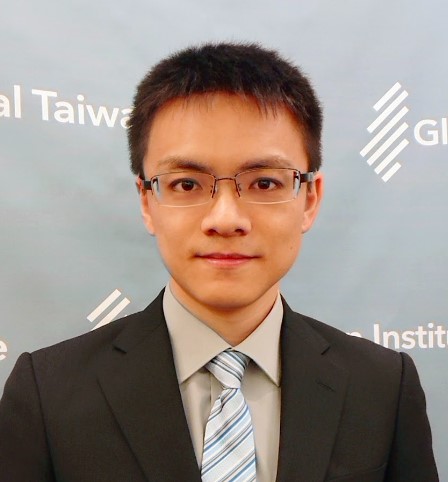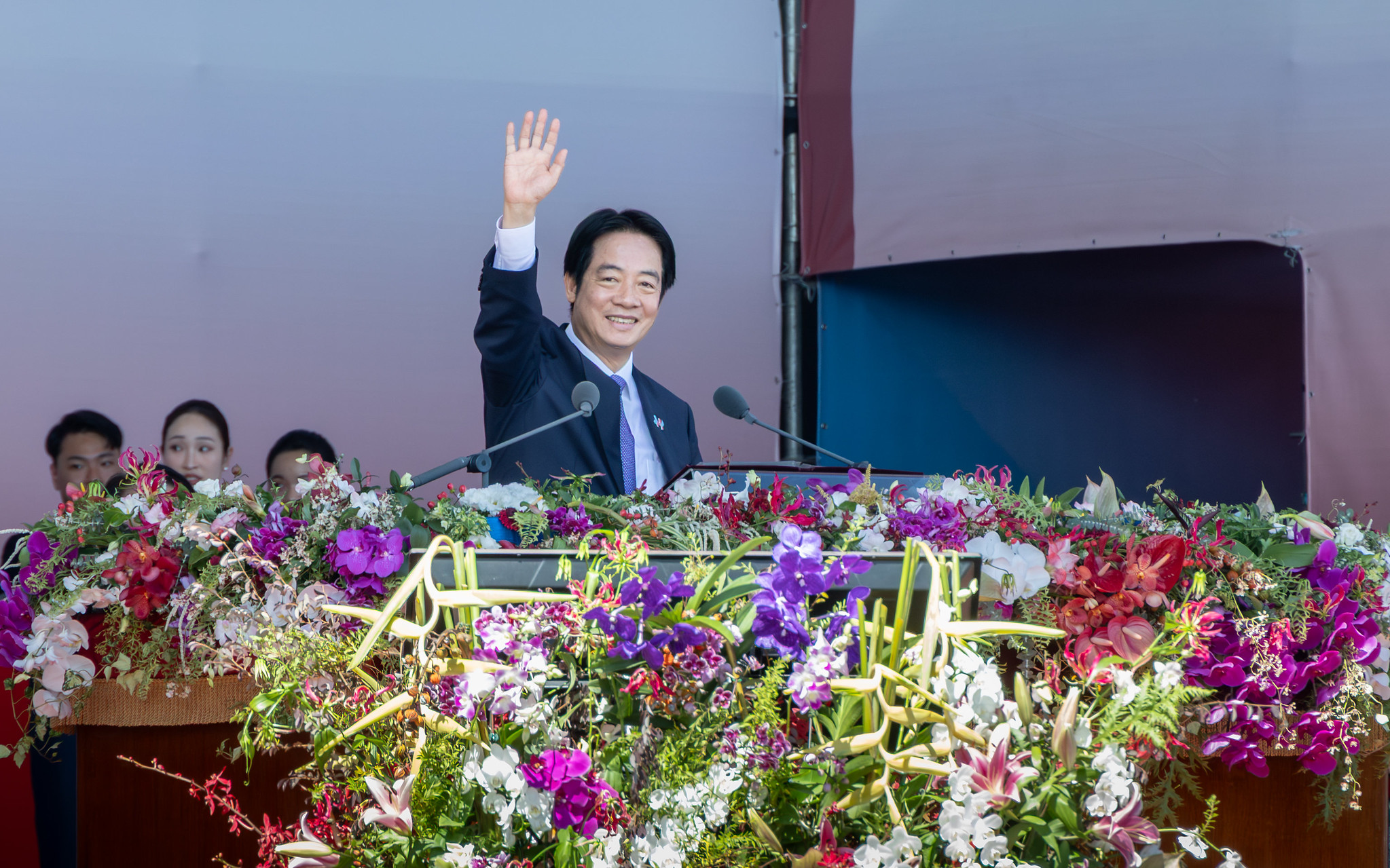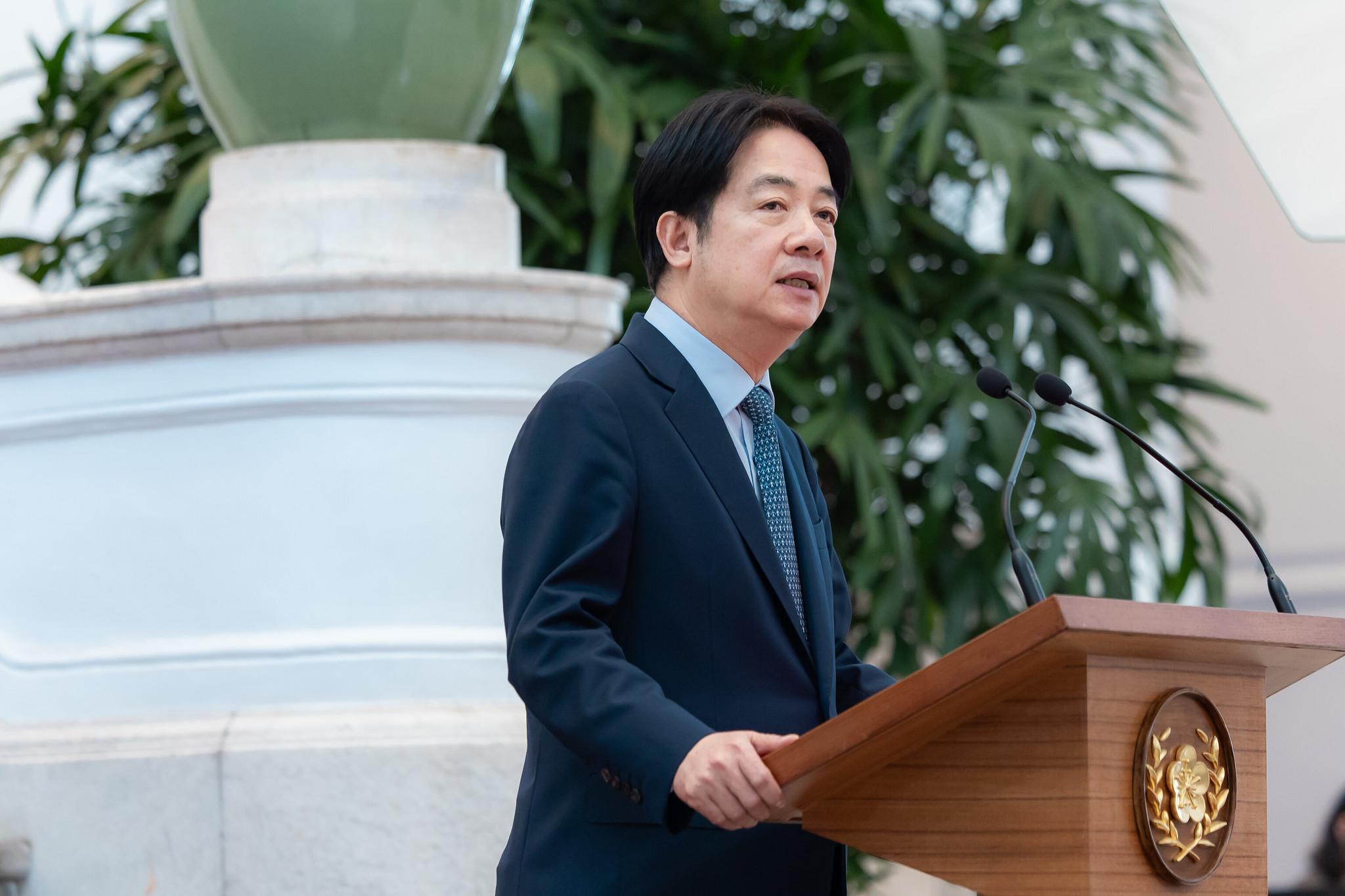In the National Day address, President Lai made only brief reference to cross-Strait relations, merely urging Beijing not to distort UN General Assembly Resolution 2758 or historical documents from World War II, reaffirming that Taiwan is not part of China. At the same time, President Lai devoted considerable attention to the direction of military preparedness and defense building. The overall message of the address was to demonstrate Taiwan’s determination for self-defense. Picture source: Taiwan Presidential Office, October 10, 2025, flickr, https://www.flickr.com/photos/presidentialoffice/54843670647/in/album-72177720329589473.
Prospects & Perspectives No. 57
President Lai’s 2025 National Day Speech: An Analysis
By Fang-Yu Chen
Taiwanese President Lai Ching-te has recently made several significant statements, including an interview on the conservative American radio program The Clay Travis and Buck Sexton Show, as well as through important interviews and op-eds by members of his national security team. More recently, President Lai also delivered his National Day address on October 10. Compared with last year’s National Day speech and previous public remarks, Lai’s 2025 address can be characterized as “light on cross-Strait issues, and heavy on national defense.” Whereas last year’s speech used some strong language regarding China’s territorial ambitions and still emphasized Taiwan’s goodwill and willingness to cooperate with China, this year Lai merely urged Beijing not to distort UN Resolution 2758 or the historical record of World War II.
This paper provides a brief summary and analysis of Lai’s speech and reviews reactions from various quarters, particularly from China, major media outlets, and think-tank circles. It argues that, since Beijing has consistently ignored the goodwill gestures of the Lai administration and has continued its international information campaign asserting sovereignty over Taiwan through the narrative of the three 80th anniversaries — the end of the war against Japan, the establishment of the United Nations, and the “restoration” of Taiwan — Taipei has correspondingly reduced its emphasis on cross-Strait dialogue. The Lai administration now places greater emphasis on societal resilience, self-defense capacity, and alignment with U.S. strategic discourse.
The National Day Speech and the Clear Signals of Taiwan
In his National Day address, President Lai made only brief reference to cross-Strait relations, merely urging Beijing not to distort UN General Assembly Resolution 2758 or historical documents from World War II, including the Cairo Declaration, the Potsdam Proclamation, and the San Francisco Peace Treaty — reaffirming that Taiwan is not part of China.
At the same time, President Lai devoted considerable attention to the direction of military preparedness and defense building. His emphasis on increasing defense spending to 3–5% of GDP, developing the “T-Dome” air defense system, advancing smart defense and combat systems, and fostering an indigenous defense industry closely echoes the statements of senior U.S. defense officials and military leaders. The overall message, or signal, of the address was to demonstrate Taiwan’s determination for self-defense.
From the content of the speech, Lai’s policy declarations remain consistent with his previous positions and have received responses from both the United States and the European Union. On cross-Strait relations, many major Western countries have also noted that it is Beijing, not Taipei, that seeks to alter the “status quo” through distortions of historical narratives.
When the National Day speech is viewed alongside Lai’s media interview on The Clay Travis and Buck Sexton Show, a coherent message emerges. In that interview, Lai reiterated that Taiwan and China are not subordinate to each other, Taiwan is not part of China, and China has no right to violate Taiwan. He stated that China’s military exercises in the Taiwan Strait undermine regional peace, while Taiwan’s pursuit of democracy, freedom, and sovereignty does not constitute provocation. Even in the face of threats, Taiwan continues to seek peaceful coexistence and mutual prosperity across the Strait, advancing what Lai called the “Four Pillars of Peace.” Those include (1) strengthening national defense: defense spending will continue to rise, reaching 5% of GDP by 2030, alongside the development of indigenous technologies such as drones and submarines; (2) enhancing economic resilience: reducing dependence on China and expanding global markets; (3) cooperating with the United States and democratic allies: pursuing a deterrence strategy to “prepare for war in order to avoid war”; and (4) upholding equality and dignity: maintaining a willingness to negotiate with China under these principles. Lai also noted that Taiwan has established a National Resilience Commission and related national security legislation to underscore its determination to defend itself.
On the technological and economic fronts, Lai reaffirmed Taiwan’s willingness to collaborate with the United States in promoting semiconductors, artificial intelligence, and re-industrialization, emphasizing that Taiwan Semiconductor Manufacturing Company’s (TSMC) investments in the U.S., Japan, and Germany play a crucial role in this global partnership.
During the same interview, Lai also addressed social policy, outlining government measures such as childcare subsidies for children aged 0–6, free tuition for public and private high schools, long-term care services, marriage and housing subsidies, and fertility treatment support, along with tax reductions to assist young families — all aimed at maintaining social stability and sustainable national development. Lai’s inclusion of these issues indicates his awareness that the declining birth rate poses challenges across multiple policy areas, including national defense, where Taiwan already faces shortages in manpower and professional military recruitment.
Two days later, during the National Day celebrations, Lai’s speech maintained the same core themes as his interview. In fact, the address should not be viewed in isolation. Rather, it forms part of a coordinated policy narrative of the National Security Council, including Deputy Secretary-General Lin Fei-fan’s op-ed in Foreign Affairs, Advisor Hsu Szu-chien’s media interview on Deutsche Welle, and Secretary-General Joseph Wu’s keynote remarks at the “International Conference on U.S.-China Strategic Competition in 2025: Implications for China and Cross-Strait Relations,” organized by the Mainland Affairs Council on October 21. In that forum, Wu systematically articulated the core of Taiwan’s current national security policy which echoes the four pillars: “Peace as the goal, strength as the foundation, resilience as the support, and international cooperation as the guarantee.” Together, these consistent and coherent signals reflect a clear and unified strategic vision guiding the Lai administration’s approach to national security and cross-Strait policy.
China’s Reaction
After Taiwan’s National Day celebrations, China issued a rebuttal to President Lai’s address. The spokesperson for the Taiwan Affairs Office employed the familiar rhetoric, accusing Lai of “seeking independence through force,” “seeking independence by relying on foreign powers,” and “expanding armaments and preparing for war.” Beijing claimed that Lai’s words and actions undermine peace and stability across the Taiwan Strait, heighten tensions, increase the burden on the Taiwanese people, and jeopardize Taiwan’s economy and future development, ultimately bringing disaster to Taiwanese society. The spokesperson again reiterated that Taiwan is a part of China.
The following day, the CCP mouthpiece People’s Daily published an article by one “Zhong Yiping” titled “Lai Ching-te Is Doomed to Be Abandoned by Taiwan’s Mainstream Public Opinion.” The piece criticized Lai for deliberately highlighting the “confrontation between democracy and authoritarianism” in his National Day speech and for portraying the mainland’s “legitimate actions” as military threats. The author accused Lai of boasting about his political achievements and courting foreign powers, dismissing his statements as “repetitive clichés” that were both laughable and despicable.”
“Zhong Yiping” is a pen name representing the voice of high-level CCP officials, particularly those focusing on Taiwan-related issues. Beijing’s response so far has been hardline, with no room for cross-Strait talks — and this despite Taiwan’s continuous extension of an olive branch to resume dialogue.
Overall, China’s discourse has shown little deviation from past patterns, revolving around a few core themes: that “stubborn Taiwan independence elements” deliberately exaggerate the China threat, distort UN Resolution 2758, and emphasize what Beijing calls “the fact that Taiwan is part of China.” Chinese officials have repeatedly claimed that Lai’s policies and actions risk provoking war and insist that nothing Lai does can alter China’s determination to achieve unification or the “reality” that Taiwan belongs to China. These remarks, lacking in originality or substance, reveal that China has no intention of engaging with the Lai administration and is unwilling to give Taiwan any credit for pursuing cross-Strait dialogue. Instead, Beijing reserves opportunities only for those groups or parties that echo its narrative.
Reactions from Main Media Outlets
This year’s National Day address differed sharply from last year’s, attracting noticeably less media attention. In 2024, U.S. think tanks, scholars, and many international media paid close attention to President Lai’s remarks, publishing several analytical pieces. By contrast, such analyses are hard to find this year — even two weeks after the speech, there have been few, if any, think-tank commentaries devoted specifically to it.
The likely reason is that last year marked Lai’s first National Day speech as president, while his administration’s overall policy direction has since remained consistent, showing little substantive change. Likewise, China’s approach and behavior have also remained largely unchanged — no matter what the United States or Taiwan says or does, Beijing continues to show hostility.
One of the few highlights that drew attention was the introduction of the T-Dome initiative, though many observers remain curious about its concrete details. So far, it appears to be more of a broad policy declaration than a fully developed plan. According to Reuters, U.S. officials welcomed Lai’s commitment to increasing defense spending, while noting uncertainty about how Beijing might respond. American officials have also stressed that no policy statement by Taiwan should ever be used as a pretext for military coercion.
Among the few available reports about Lai’s address, most commentators share the view that President Lai has softened his tone toward China. In this year’s address and related remarks, Lai confined his criticism mainly to Beijing’s distortion of several historical documents. He put significantly less attention on China’s attempt to wage war against Taiwan, nor did he employ language such as “resisting aggression.”
Overall, both the frequency and intensity of references to the China threat have clearly diminished. Instead, Lai’s discourse places greater emphasis on Taiwan’s own responses and determination to strengthen self-defense. Actually, these are the two sides of the same coin.
Conclusion
President Lai’s speech and the recent focus of Taiwan’s national security team demonstrate a clear and consistent direction: the comprehensive policy goal of seeking “peace through strength.” In terms of rhetoric, the messaging is clearly tailored to align with the current priorities of the United States. This strategy resembles those adopted by many countries — such as NATO members and several allies of the U.S. — that have sought to respond to the policies of the Trump administration in a similar fashion.
Many actors have now grasped the essence of how the Trump administration operates: it favors clear and ambitious objectives, requires concrete numerical targets (for instance, defense spending as a percentage of GDP), and emphasizes burden-sharing among allies. For Taiwan, strengthening self-defense capabilities has always been the foremost objective of its national defense policy. Using this moment to push those goals even further is therefore entirely consistent with Taiwan’s national interests.
(Fang-Yu Chen is Associate Professor of Political Science, Soochow University, Taiwan.)



